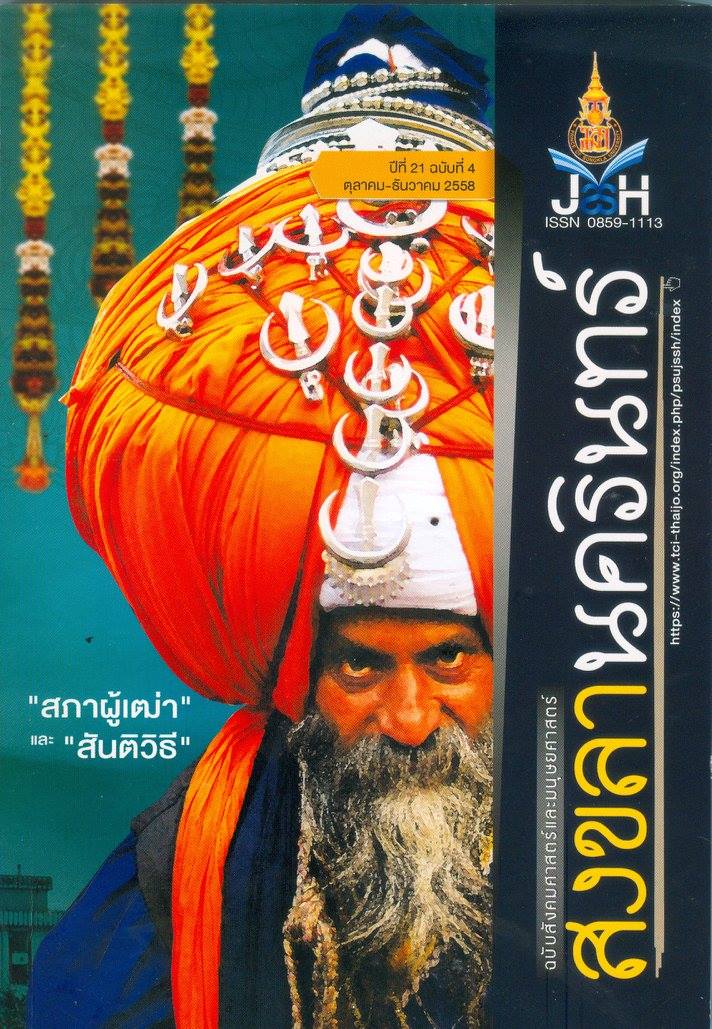<b> ชาวซิกข์และปฏิบัติการสันติวิธี</b><br>The Sikhs and Non-Violent Practices
Keywords:
India, Non-Violent Practices, the SikhsAbstract
Abstract
In this review article, the author begins by looking at a brief history of the Sikhs, both as victims and perpetrators of violence in Indian history to
show how the Sikhs have been confronted with and involved in this tragic episode in history. Besides their violent history, the Sikhs have also been labeled as “separatists” and “extremists.” The author, however, tries to provide evidence of the non-violent practices of the Sikhs which have broadly affected social perception and reflected intelligence, notably
the principle of non-cooperation (Swadeshi), social reform, blood donation for non-violent revenge, and resistance to violence. The non-violent practices have included cooperation towards a city becoming
peaceful and tolerant, as well as mosque restoration in a shared sacred space of both Muslims and Sikhs. Through the contribution of this paper, the author elucidates the Sikhs’ history of experience with violence, including a body of non-violent practices and knowledge based on Sikh religious beliefs. This history is presented for the consideration of Thai non-violence scholars.
บทคัดย่อ
บทความปริทัศน์นี้ ผู้เขียนจะเริ่มต้นกล่าวถึงประวัติศาสตร์ฉบับย่อว่าด้วยความรุนแรงที่สัมพันธ์
กับชาวซิกข์ ทั้งในฐานะเป็นเหยื่อและผู้กระท�าการในประวัติศาสตร์ประเทศอินเดีย เพื่อฉายภาพว่าชาวซิกข์เผชิญและมีส่วนในความโหดร้ายอย่างไรอีกทั้ง ท่ามกลางความโหดร้ายที่ว่านี้ยังมีความพยายามประทับตราว่าชาวซิกข์เป็นพวกแบ่งแยกดินแดนและนิยมความรุนแรงนับจากความขัดแย้งกับรัฐบาลอินเดียในช่วงทศวรรษที่ 1980 เป็นต้นมาอย่างไรก็ตาม ผู้เขียนได้พยายามค้นหาร่องรอยและประมวลปฏิบัติการต่อสู้อย่างสันติวิธีของชาวซิกข์ในรูปแบบที่ส่งผลต่อการรับรู้และสะเทือนทางปัญญาต่อสังคมในวงกว้าง ไม่ว่าจะเป็นหลักการไม่ให้ความร่วมมือ หลักการปฏิรูปกฎเกณฑ์สังคม หลักการบริจาคเลือดเพื่อแก้แค้น หลักการปฏิเสธการใช้ความ
รุนแรง ตลอดจน การร่วมผลิตซ�้าความหมายต่อเมืองหนึ่งให้เป็นเมืองที่ว่าด้วยสันติภาพและขันติธรรม และการร่วมมือปฏิสังขรณ์มัสยิดเพื่อใช้สวดมนต์ร่วมกันกับศาสนาอิสลาม ขณะที่คุณูปการของบทความนี้ผู้เขียนคาดหวังให้สังคมไทยเข้าใจประวัติศาสตร์ความรุนแรงที่เกี่ยวข้องกับชาวซิกข์ รวมถึง เป็นการริเริ่มเสนอองค์ความรู้ชุดหนึ่งว่าด้วยการไม่ใช้ความรุนแรงบนพื้นฐานความเชื่อทางศาสนาซิกข์ต่อวงวิชาการด้านสันติศึกษาของสังคมไทย
ค�าส�าคัญ: ชาวซิกข์, ปฏิบัติการสันติวิธี, ประเทศ
อินเดีย










